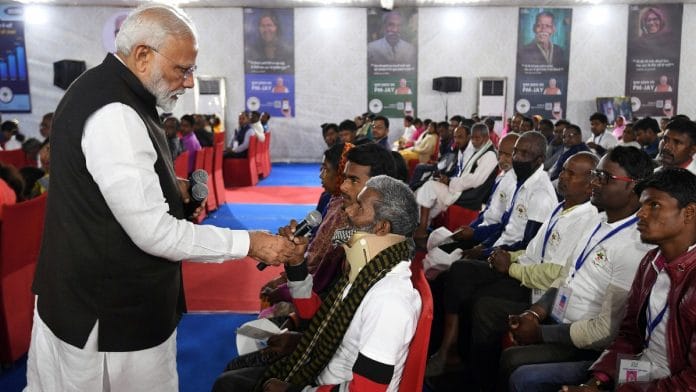New Delhi: Prime Minister Narendra Modi announced Tuesday that citizens aged 70 years and above would be included in its flagship national health scheme Ayushman Bharat for an outlay of Rs 3,537 crore, nearly six weeks after the cabinet approved it.
Under the Ayushman Bharat-Pradhan Mantri Jan Arogya Yojana (AB-PMJAY), beneficiaries are entitled to cashless admission of up to Rs 5 lakh for secondary and tertiary-level healthcare in empanelled hospitals.
The programme, which was rolled out in 2018, was aimed initially at 12.3 crore families of low socio-economic status.
The government has estimated that India has a total of nearly 6 crore people who are 70 and above.
While many of them are already covered on account of being in low-income groups–and others are beneficiaries of government health plans such as the Central Group Health Scheme (CGHS)–an additional 2.72 crore people from 1.96 crore families, irrespective of their income status, have now been added to the beneficiary pool.
The new beneficiaries will be issued Ayushman Vaya Vandana Cards upon registration.
On the occasion of Ayurveda Day, at an event organised at the All India Institute of Ayurveda (AIIA) in Delhi, Modi launched several initiatives amounting to nearly Rs 12,855 crore.
Also Read: PM Modi to launch multiple health projects, distribute 51,000 appointment letters Tuesday
New projects announced
As part of the health ministry’s initiatives, the PM inaugurated three medical colleges in Madhya Pradesh; facility and service extensions at various AIIMS and other government institutions and a Central Drugs Testing Laboratory (CDTL) in Odisha.
In addition, he also laid the foundation stone for various health infrastructure projects amounting to more than Rs 925 crore.
With the aim of enhancing access to health services in India with fully digitalised immunisation services for pregnant women and children, Modi also launched the U-WIN portal, which is estimated to benefit 2.9 crore pregnant women and 2.6 crore infants annually.
“It will ensure the timely administration of life-saving vaccines to pregnant women and children (from birth to 16 years) against 12 vaccine-preventable diseases,” the government said in a statement.
Additionally, to extend the reach of healthcare services to hard-to-reach areas, drone services at 11 tertiary care institutions, mainly AIIMS in various states, were also launched.
Under the Department of Pharmaceuticals, Modi inaugurated five projects under the production-linked incentive (PLI) scheme for medical devices and bulk drugs in five states with an aim to manufacture high-end medical devices, such as body implants and critical care equipment, along with important bulk drugs like penicillin-G and clavulanic acid.
These initiatives support India’s goal of reducing import dependence and enhancing local manufacturing capabilities in medical devices and bulk drugs, the government said.
Modi also laid the foundation stone of four centres of excellence at the National Institutes of Pharmaceutical Education and Research in various cities, apart from inaugurating and laying the foundation stones of ESIC hospitals.
Under the Ministry of AYUSH, Modi also inaugurated phase II of All India Institute of Ayurveda, first started in 2017, which includes a 150-bed Panchakarma hospital, an Ayurvedic pharmacy, a sports medicine unit, and extensive accommodation facilities which will cost the exchequer nearly Rs 289 crore.
In addition, foundations were laid for two central research institutes in yoga and naturopathy in Odisha and Chhattisgarh.
(Edited by Tikli Basu)
Also Read: Ayushman Bharat scheme to be implemented in Odisha by this fiscal: Health minister






